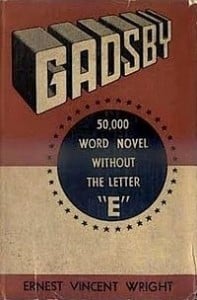Gadsby – the novel without the letter E
 Somewhat related to a recent post about Michel Thaler’s verbless novel, I was recently made aware of a 1939 book by American author Ernest Vincent Wright called Gadsby. The novel is written as what is called a lipogram – a word game by which you avoid a particular letter or group of letters. Wright chose in Gadsby to avoid the English language’s most popular letter: E.
Somewhat related to a recent post about Michel Thaler’s verbless novel, I was recently made aware of a 1939 book by American author Ernest Vincent Wright called Gadsby. The novel is written as what is called a lipogram – a word game by which you avoid a particular letter or group of letters. Wright chose in Gadsby to avoid the English language’s most popular letter: E.
In case you aren’t aware of just how important the letter E is in English, it’s quite interesting to see just how limited he was in certain ways. For example, There is no number between six and thirty that he was able to use in the book, and couldn’t use any number containing one, three or five, either. Wright also had huge problems in using verbs in the past tense, since the standard past tense ending for the vast majority of English verbs is -ed.
The novel is 50,110 words long and does not feature a single E, and in order to make the lack of the letter E more natural it is written from the point of view of an anonymous narrator who curses his own poor writing skills. “I trust”, says the author in the novel’s introduction, “that a critical public will hold constantly in mind that I am voluntarily avoiding words containing that symbol which is, by far, of most common inclusion in writing our Anglo-Saxon as it is, today.”
As a novel in itself, it may not be a masterpiece – but as a work of ‘constrained writing’, it certainly is an amazing literary feat.
If you’re interested, you can download the entire text of Gadsby for free. [PDF, 389Kb)
